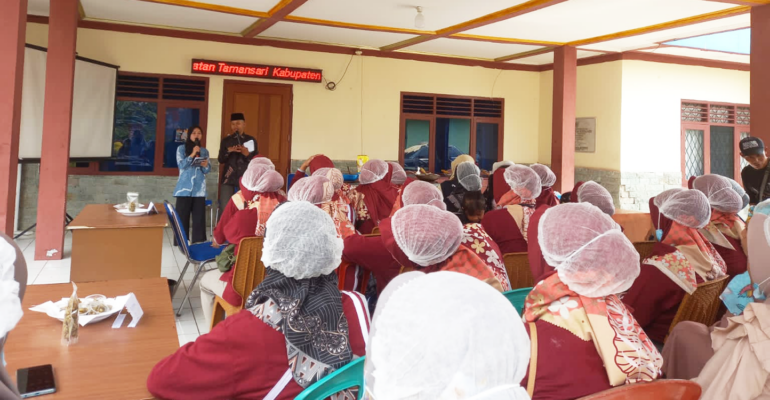Solution to Fish Stunting, PPK Ormawa Himakua IPB University Holds Baby Fish Processing Workshop in Sukajadi Village

The IPB University student team of the Student Organization Capacity Strengthening Program (PPK Ormawa) from the Aquaculture Student Association (Himakua) conducted training activities in the form of Workshop #1 Processing of Tilapia Baby Fish Fishery Products to several target residents in Sukajadi Village, Tamansari District, Bogor Regency, West Java. This workshop activity is a form of downstream effort from tilapia aquaculture production activities.
According to the team leader, Muhammad Bimosena Sofiawan, Sukajadi Village is an area with abundant clean water availability, making it very suitable for tilapia farming activities. However, the potential of this farming activity is still followed by some limiting obstacles, such as the slow growth of tilapia in the hatchery segment, or what is commonly known as ‘stunted tilapia’.
“Unlike its name, stunted tilapia can open up new potential in the processing sector. The utilization of stunted tilapia seeds can be done by processing them into baby fish. This step not only reduces waste and losses for tilapia farmers, but also creates new processed food products with high economic value,” he explained.
Baby fish with its savory taste and crunchy texture has a wide market potential as a healthy and nutritious snack. This potential opens up great opportunities for villagers, especially mothers and young women to develop innovative processing products as a source of additional income and support the development of the local fisheries industry in a sustainable manner.
The baby fish processing training was guided directly by the resource person, Nurul, who came from the sister village, Purwasari Village. The workshop was attended by the Chairman of Sukajadi Village, Chairman of Family Empowerment and Welfare (PKK), Chairman of Posyandu, Chairman of Youth Organization, Chairman of Village-Owned Enterprises (BUMDes), Chairman of RW, Tamansari District Fisheries Extension Officer, and Food Security Cadres.
This activity was welcomed by the Tamansari District Fisheries Extension Officer, Ira Kamasari, who said, “This activity is able to produce products that are very potential to be processed which have high selling value and can attract children to eat fish.”
“Hopefully, IPB University students who are running this program can also expand the marketing network in order to increase community income and help reduce the number of stunted children,” she added.
The workshop began with a live product demonstration, followed by around 30 women from the PKK and Posyandu of Sukajadi Village as the target community.
“Baby fish can be an additional menu idea for the diverse, nutritious, balanced, and safe (B2SA) food competition, especially from Sukajadi Village,” said Atikah, a Food Security Cadre.
According to Neng, one of the PKK members, this workshop was very exciting and could add new knowledge, especially in the field of fishery product processing. “I like to cook fish, but this is the first time for baby fish. It’s a little difficult to weed the baby fish, but it’s great to learn with the students,” she said.
“This program is good, especially for those who don’t like to eat fish directly because baby fish can be eaten with rice as a snack. My hope is that this activity is not only done once but can be developed with other processing training,” said Neng.
Nurul as the resource person gave an appeal and direction that processed baby fish products can be consumed for various groups. With this program, she hopes that it can be the first step for target residents to process fishery potential in the form of tilapia and can be marketed.
Want to know more about Himakua 2024 PPKO activities? Come follow the Himakua Instagram social media account at @himakuaipb and the Himakua PPKO team Instagram at @ppko.himakua. (*/Rz) (IAAS/Hap)



